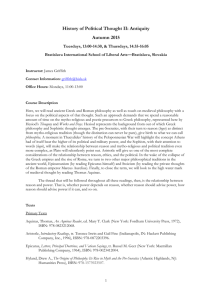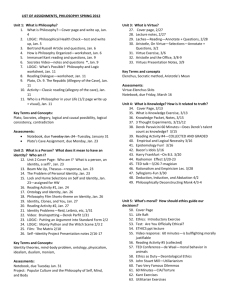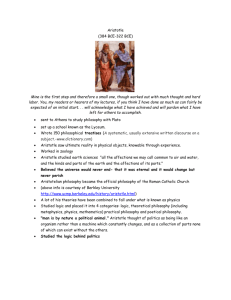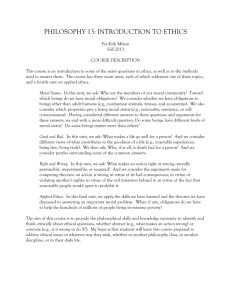Syllabus and Schedule for First Half of Term
advertisement
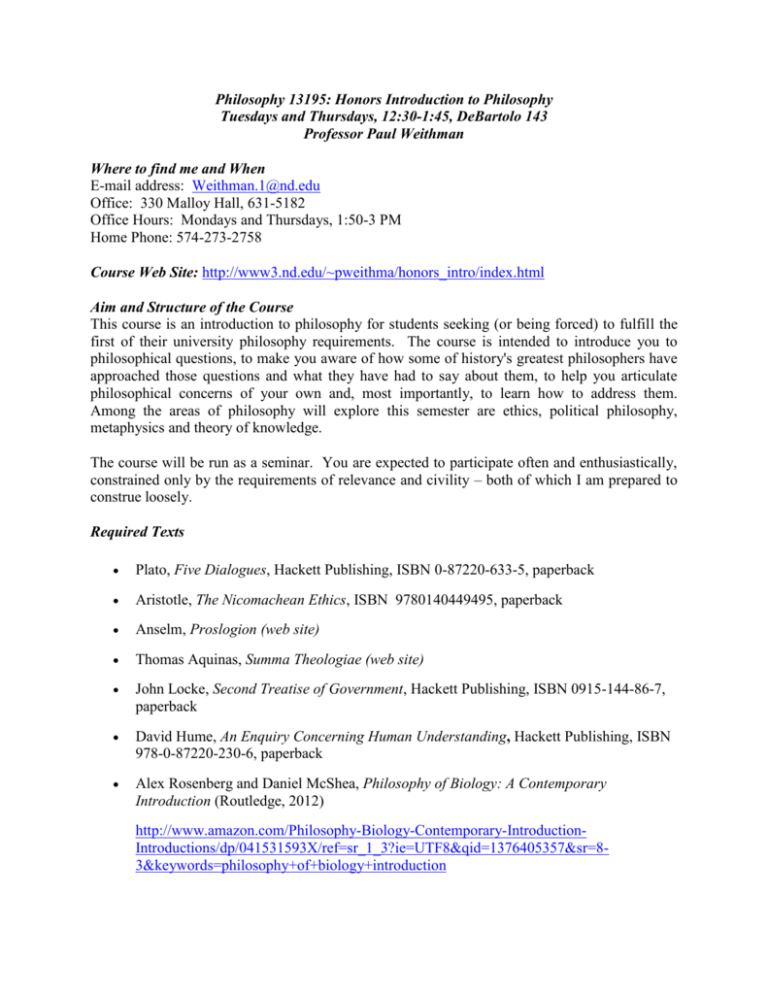
Philosophy 13195: Honors Introduction to Philosophy Tuesdays and Thursdays, 12:30-1:45, DeBartolo 143 Professor Paul Weithman Where to find me and When E-mail address: Weithman.1@nd.edu Office: 330 Malloy Hall, 631-5182 Office Hours: Mondays and Thursdays, 1:50-3 PM Home Phone: 574-273-2758 Course Web Site: http://www3.nd.edu/~pweithma/honors_intro/index.html Aim and Structure of the Course This course is an introduction to philosophy for students seeking (or being forced) to fulfill the first of their university philosophy requirements. The course is intended to introduce you to philosophical questions, to make you aware of how some of history's greatest philosophers have approached those questions and what they have had to say about them, to help you articulate philosophical concerns of your own and, most importantly, to learn how to address them. Among the areas of philosophy will explore this semester are ethics, political philosophy, metaphysics and theory of knowledge. The course will be run as a seminar. You are expected to participate often and enthusiastically, constrained only by the requirements of relevance and civility – both of which I am prepared to construe loosely. Required Texts Plato, Five Dialogues, Hackett Publishing, ISBN 0-87220-633-5, paperback Aristotle, The Nicomachean Ethics, ISBN 9780140449495, paperback Anselm, Proslogion (web site) Thomas Aquinas, Summa Theologiae (web site) John Locke, Second Treatise of Government, Hackett Publishing, ISBN 0915-144-86-7, paperback David Hume, An Enquiry Concerning Human Understanding, Hackett Publishing, ISBN 978-0-87220-230-6, paperback Alex Rosenberg and Daniel McShea, Philosophy of Biology: A Contemporary Introduction (Routledge, 2012) http://www.amazon.com/Philosophy-Biology-Contemporary-IntroductionIntroductions/dp/041531593X/ref=sr_1_3?ie=UTF8&qid=1376405357&sr=83&keywords=philosophy+of+biology+introduction Course Requirements Participation – Because this course is run as a seminar, your participation in discussions is extremely important. Attendance – Obviously you can participate in the seminar only if you attend it. Your regular attendance is therefore expected. Reading – Obviously your participation in the seminar can be informed only if you have read the material assigned for the day with care. It is therefore expected that you will keep up with the reading. Writing – This seminar requires you to write papers regularly and to rewrite them occasionally. One purpose of the paper assignments is to improve you ability to write clearly and analytically. Another is to prepare you for discussion by forcing you to read carefully and think rigorously about the material about which you have to write. Exams There will be a cumulative final exam, probably oral. Grading Course grades will be based largely on the writing assignments and on the exams, though participation will be an important factor. Schedule, First Half of Term Tuesday, August 27 Introduction to the Course; Rosenberg and McShea, Philosophy of Biology, “Intro” Thursday, August 29 Plato, Euthyphro Tuesday, September 3 Plato, Euthyphro Thursday, September 5 Plato, Meno Tuesday, September 10 Plato, Meno Thursday, September 12 Aristotle, Ethics, Book I, especially i-ix Tuesday, September 17 Aristotle, Ethics, Book I Thursday, September 19 Aristotle, Ethics, Book II, esp. i-iv Tuesday, September 24 Aristotle, Ethics, Books II Thursday, September 26 Aristotle, Ethics, Book X Tuesday, October 1 St. Anselm, “From the Proslogion” Thursday, October 3 Gaunilo “Reply on Behalf of the Fool” Tuesday, October 8 Thomas Aquinas, “The Existence of God” Thursday, October 10 Thomas Aquinas, “The Existence of God” Tuesday, October 15 Thomas Aquinas, “The Existence of God” Thursday, October 17 Shapin, “What was Known” Tuesday, October 16 Fall Break Thursday, October 18 Fall Break

